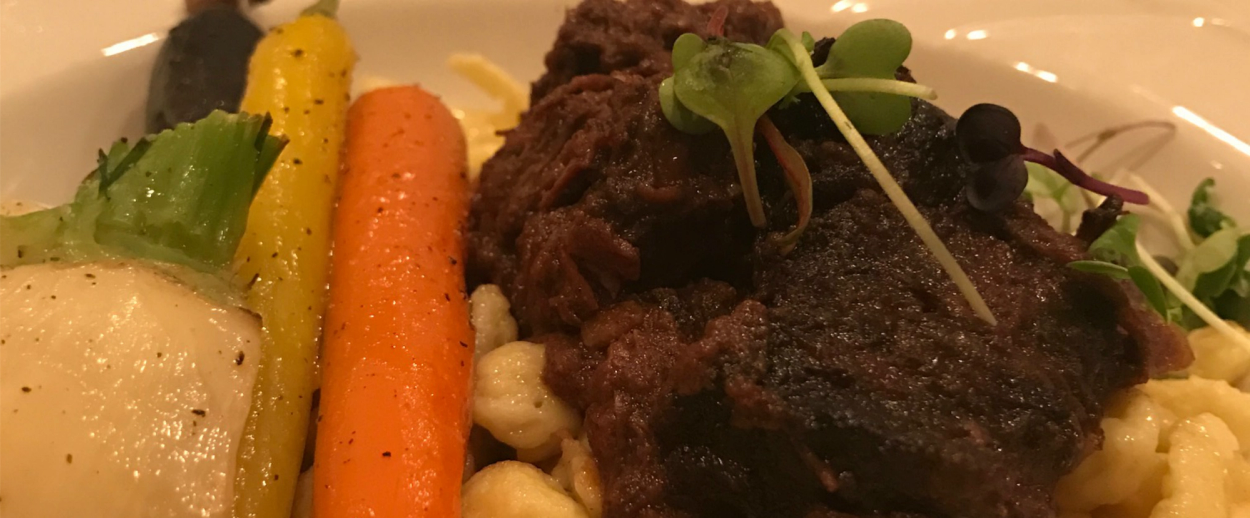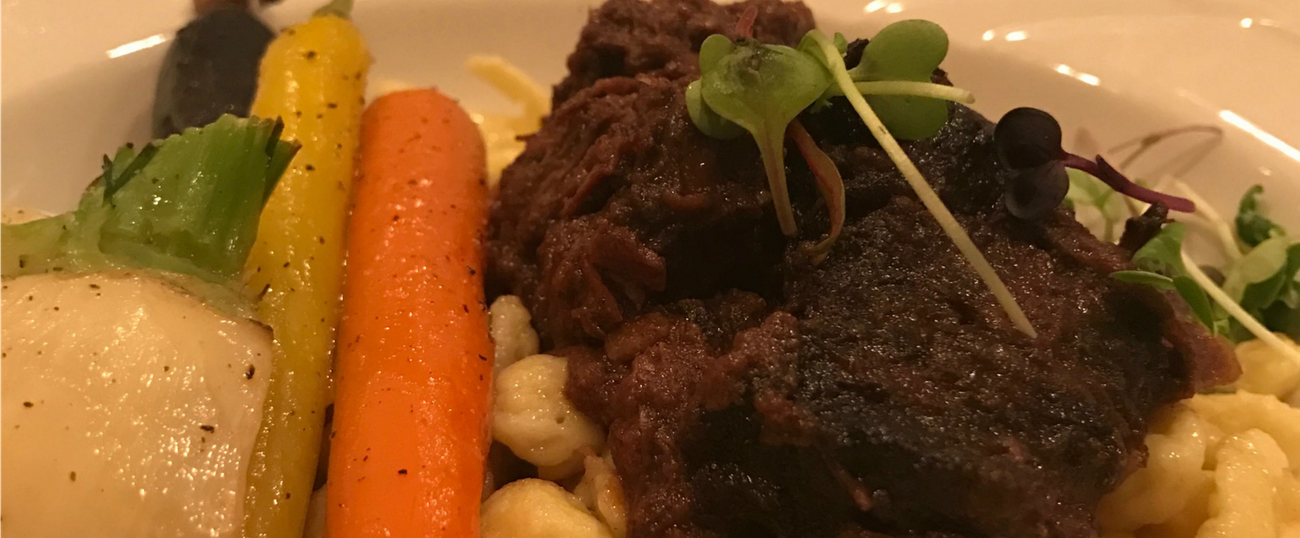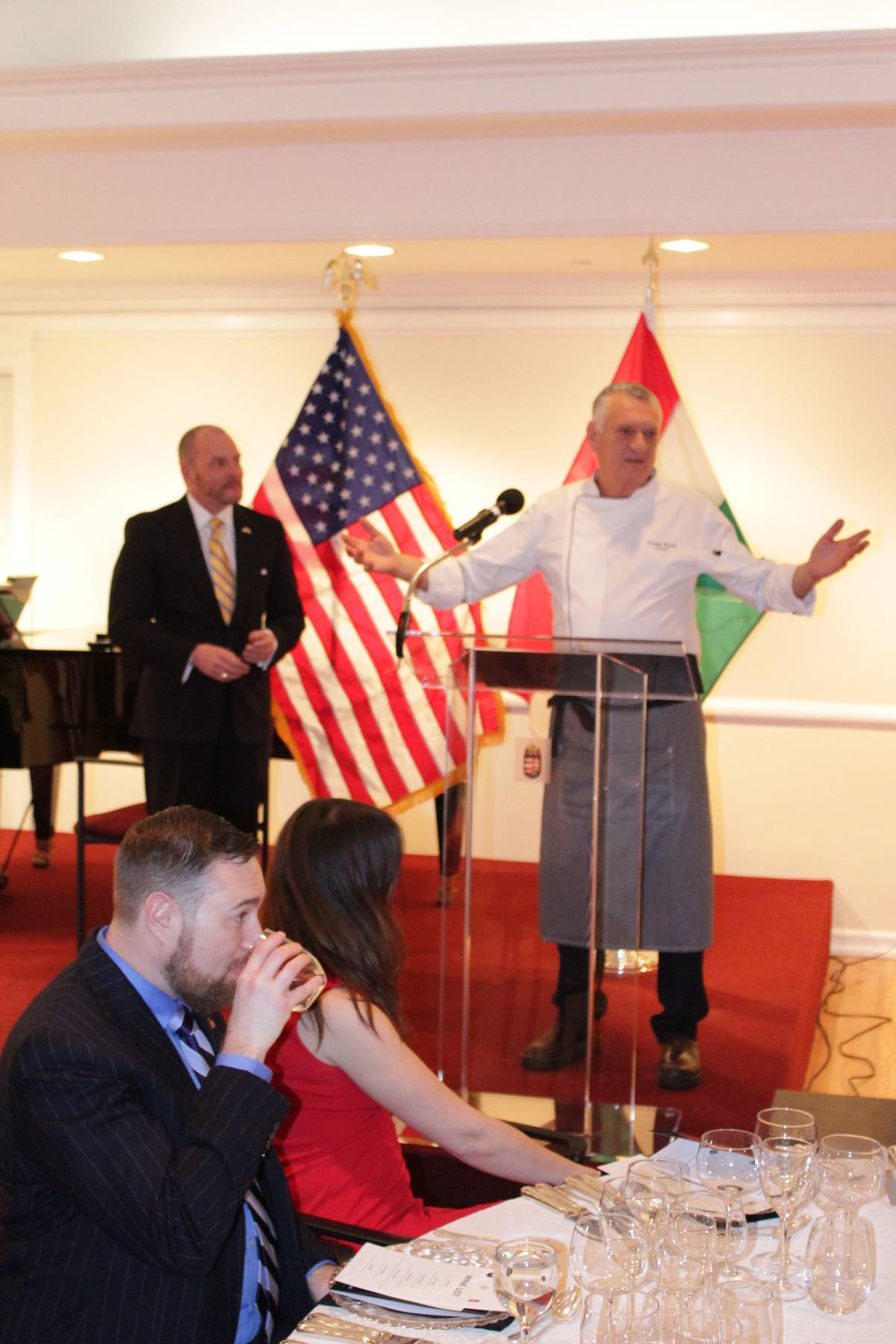Star Chef Offers Israeli-Hungarian Fusion in New York
At a special, six-course dinner at the Hungarian Consulate, Yossi Elad married the flavors of Jerusalem with the foods of his youth




With restaurants like Machneyuda in Jerusalem and The Palomar in London, Yossi Elad has emerged as a key figure in Israel’s recent gastronomic revolution. Relying heavily on seasonal ingredients, Elad and his two partners, Assaf Granit and Uri Navon—their flagship Jerusalem restaurant is named after the city’s iconic open-air market, Machane Yehuda—have pioneered a school of modern Jerusalem cooking that has inspired many copycats but has few real rivals.
But the other night found Elad far from his customary turf—and his usual repertoire.
On Monday, the chef was in New York serving up a six-course “Hungarian Culinary Experience” hosted by the city’s Hungarian Consulate. The lively event, attended by some 95 diners, was a benefit for the newly-launched Friends of the Budapest Jewish Cemetery, a non-profit designed to help restore the Hungarian capital’s Kozma Street Cemetery. Famous for its art nouveau monuments and mausoleums, it is often ranked among the great cemeteries of the world. The dinner was also sponsored by the Magyar Foundation of North America, an organization that seeks to promote Hungarian culture in the U.S.

“I’m not used to talking; I’m used to working in the kitchen,” Elad told the assembled as he introduced himself and his menu. Born in Czechoslovakia to a Hungarian-speaking family, Elad made aliyah with his parents when he was still a baby. He grew up eating Hungarian staples like chicken paprikash, stuffed pepper, noodles with cabbage, and fruit-filled dumplings. Elad noted that Israel wasn’t always such a culinary wonderland, a fact he evoked with a bit of family lore. “What are you going to eat there?” his grandmother asked as the future chef and his parents were leaving for the new Jewish State. For Elad, his grandmother’s sense of wonder was at once a reflection on the bareness of the Levantine pantry and a not-too-subtle dig at his mother’s lack of skill in the kitchen.
In his cooking on Monday, Elad demonstrated no such lack. Indeed, his first appetizer managed to be the food equivalent of the sort of optical illusion where the same picture can look like two different things to two different people. Those familiar with Israeli cuisine could readily identify the individual servings of ratatouille with egg as shakshuka. To the Hungarians in the room, it was clear that they were eating lecsó. In the first seated course, Hungarian and Israeli elements blended to make a unique whole; a “duet” of baked cabbages—one white, one purple—were sprinkled with caraway seeds (a mainstay of the Hungarian kitchen) and placed upon a creamy bed of macadamia nut tahini.
Though raised in a moderately observant environment, Elad—like most of today’s elite Israeli chefs—does not normally concern himself with the kosher laws. And so, Monday’s dinner, which was prepared under strict rabbinic supervision, presented him with certain challenges. Elad wanted to offer a play on chestnut purée, a classic Hungarian dessert. Instead of serving the chestnut sweet, Elad thought he’d experiment with a savory purée stuffed into a zucchini blossom, but the evening’s kosher supervisor was worried about the bugs that might live in such a flower and nixed the idea. Elad instead baked the purée into some pastry and called it a savory profiterole.
As the dinner unfolded, Elad ambled through the dining room assessing the reaction to his creations. An avuncular teddy bear of a man, he didn’t project fussy perfectionism so much as he did relaxed charm. During the third course—a fish soup that many regarded as the evening’s highlight—Elad walked over to his girlfriend’s table and gallantly fed her a spoonful. A neighboring diner, a winsome blue-eyed twentysomething, asked to be fed a spoonful of her own. Elad gamely obliged.
Though most of the evening’s dishes attempted to bring together Elad’s Hungarian and Israeli selves, other stops on his culinary journey were also represented. When asked how one course—a brioche sandwich with duck confit—fit into the mix, he confessed that the influence was neither Israeli nor Hungarian, but French. He learned it from a food truck that would park near his London restaurant. The big difference between this version and the original, he said, was the slab of blue cheese he left off in order to keep the dish kosher.
To round out the dinner Elad again offered a twist on an old Hungarian classic: cold cherry soup. Instead of serving it as a first course, as would be the custom in Hungary, Elad offered it as a dessert. In a further departure, he doctored the dish with figs and lemon-basil sorbet. There was just one problem: Local figs are hard to come by in the middle of a blizzard-racked winter. But on this score, the dedicated locavore decided not to be doctrinaire.
“In New York,” he mused, “anything’s possible.”
Gabriel Sanders is Tablet’s director of business development.